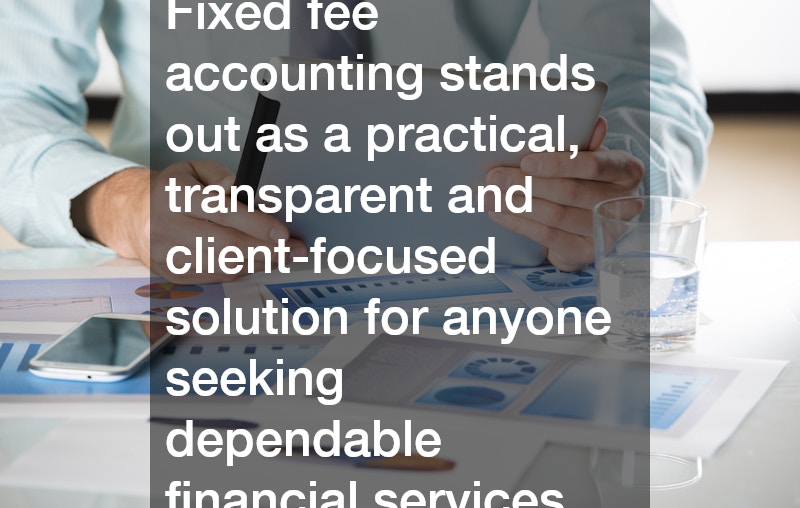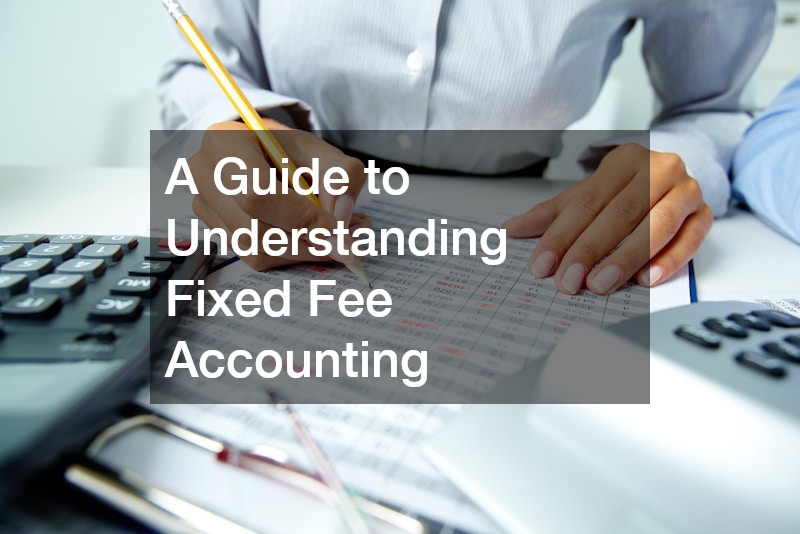In today’s complex financial environment, clarity and predictability are more important than ever, especially for small business owners and individuals navigating their financial obligations. One concept gaining significant traction is fixed fee accounting, a model that shifts away from traditional hourly billing and instead offers a transparent, consistent pricing structure for accounting services. This approach not only eliminates surprise charges but also helps clients plan their budgets more effectively.
Understanding the mechanics of fixed fee accounting, how it compares to conventional models and what benefits it provides is essential for anyone looking to make smarter financial decisions.
What Is Fixed Fee Accounting?
Fixed fee accounting is a pricing model where accounting firms or individual accountants charge a predetermined amount for specific services, rather than billing clients by the hour. This means that from the outset, both the accountant and the client agree on the scope of work and the total cost involved. Whether it’s preparing financial statements, lodging tax returns or providing advisory services, the fee is set and agreed upon in advance. This structure is particularly appealing for businesses seeking greater financial control and for individuals who prefer predictability in their service expenses. Unlike traditional billing models that may fluctuate depending on how much time an accountant spends on a task, fixed fee accounting ensures that costs remain constant unless the scope of work changes.
Why Businesses Are Embracing the Fixed Fee Model
For many businesses, particularly startups and small enterprises, cash flow management is a constant challenge. In this context, fixed fee accounting becomes a practical solution. Knowing precisely how much you’ll pay for accounting services allows for better financial planning and removes the anxiety of receiving an unexpectedly large bill at the end of the month. Moreover, it fosters stronger working relationships between clients and accountants. Since there’s no incentive to prolong billable hours, accountants can focus on delivering value and results rather than time spent. Clients, in turn, feel more comfortable asking questions and seeking advice, knowing they won’t be charged extra for every interaction. This kind of open communication is invaluable for achieving financial health and compliance.
Comparing Fixed Fee & Hourly Billing Structures
To appreciate the benefits of fixed fee accounting, it’s helpful to compare it with the more traditional hourly billing model. Hourly billing often leads to uncertainty, as clients cannot predict how much time a task will require or how much it will ultimately cost. Additionally, hourly billing may inadvertently encourage inefficiencies, as there’s no built-in incentive for accountants to work more quickly or to prioritise tasks that provide the greatest benefit to clients. In contrast, fixed fee accounting aligns the interests of both parties. Accountants are motivated to complete work efficiently and effectively, while clients gain peace of mind knowing their costs are capped unless they request additional services. The result is a more streamlined and mutually beneficial engagement.
Customising Services for Value & Flexibility
Although the term “fixed fee” might imply rigidity, many accountants who adopt this model offer flexible, customisable service packages tailored to individual client needs. A business may require ongoing bookkeeping, quarterly reporting, annual tax returns and strategic advice, all bundled into a fixed monthly fee. Meanwhile, an individual might need only one-off tax preparation. The key is that the scope of work is clearly defined and any additional services are quoted separately before work begins. This structure allows clients to scale services up or down as their needs change, all while maintaining control over their accounting budget. In this way, fixed fee accounting strikes a balance between structure and adaptability, catering to a wide range of financial needs.
Choosing the Right Accountant with a Fixed Fee Model
As the popularity of fixed fee accounting grows, it’s important for clients to choose service providers who are transparent, reliable and experienced in offering this pricing model. Not all accountants are equally skilled at estimating the time and resources required for specific tasks, which can impact the accuracy and fairness of the quoted fee. Good accountants will also conduct a needs analysis to ensure the fixed fee proposal is appropriate and sustainable for both parties. A strong client-accountant relationship built on trust and transparency is the cornerstone of making fixed fee accounting work effectively.
The Future of Accounting Services
As more individuals and businesses seek greater financial predictability and improved service experiences, fixed fee accounting is expected to become increasingly common across Australia. This model reflects a broader shift in professional services toward client-centric practices that prioritise outcomes and relationships over transactional billing. It also aligns with digital accounting trends, where cloud-based platforms and automated processes enable accountants to deliver services more efficiently. As technology continues to advance, the fixed fee model will likely evolve further, offering clients even greater value and accountants new opportunities to innovate their service offerings.
Clarity & Control Through Fixed Fee Accounting
In a world where financial unpredictability can cause significant stress, fixed fee accounting offers a refreshing alternative. It empowers clients by providing clarity around costs, encouraging better financial planning and enabling more open, constructive relationships with accounting professionals. Whether you’re a small business owner navigating compliance or an individual looking for straightforward tax support, this pricing model offers consistency and peace of mind. As the accounting industry continues to evolve, fixed fee accounting stands out as a practical, transparent and client-focused solution for anyone seeking dependable financial services.
.




